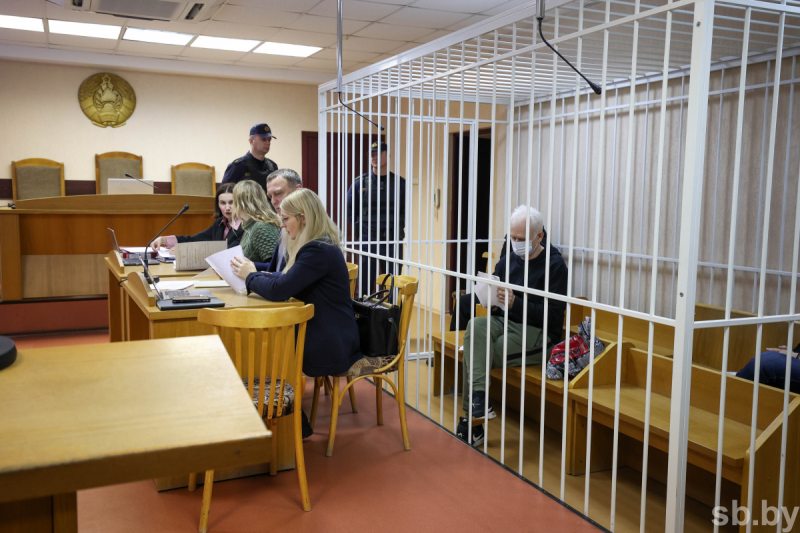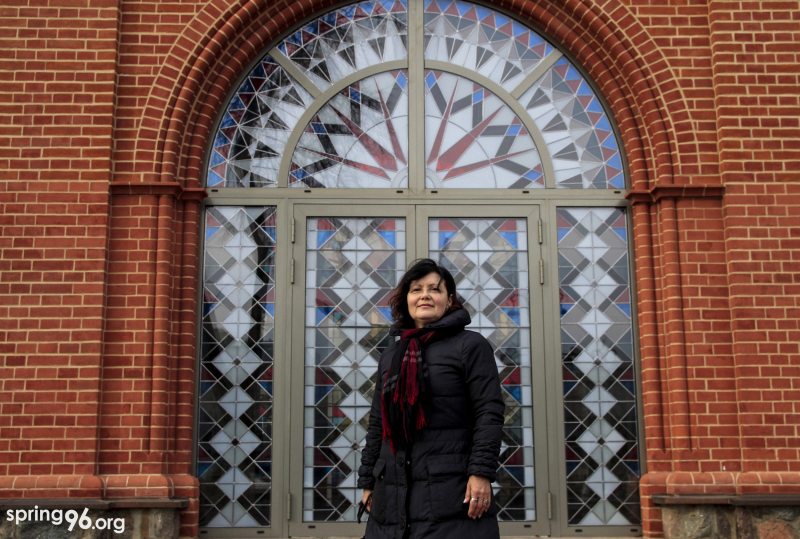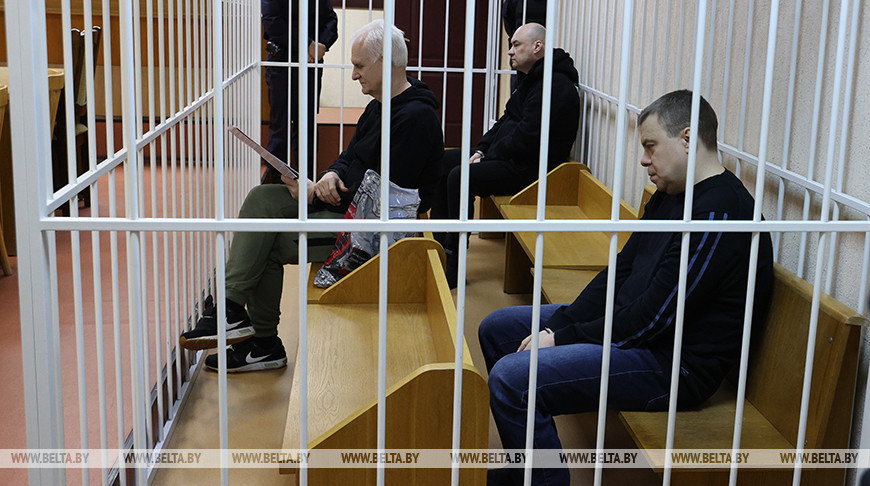Viasna trial through the eyes of a spectator: Prosecution evidence is questionable and security measures unprecedented
For the second week now, the Lieninski District Court of Minsk has been hearing the Viasna case. The court has read out the indictment, questioned several witnesses, and studied the seventh part of the written materials of the case. Viasna spoke to a spectator who attended the hearings and to a human rights activist Alena Masliukova about their impressions of the process.

- Viasna case trial on January 5, 2022
Multi-step security checks at court
The spectator notes that unprecedented security measures were taken at court:
“One can assess the scale of the case by the security measures that the authorities have set up in front of and inside the court building. A police unit with a small loudspeaker is on duty in front of the court. Inside the House of Justice, visitors to the courthouse are met by another police unit, which asks where the person is going. If one is to attend a smuggling and protest financing case hearing at the Lieninski District Court, personal data including the date of birth are written down on a separate sheet of paper.
From there on, the security measures only intensify. At the entrance to the room where the trial in the "Viasna case" is taking place, there is a metal detector and a uniformed police officer. While spectators are being examined, the officer takes the whole process on video. Not only the spectators, but also the lawyers of the accused undergo this humiliating procedure before every hearing, both in the morning and in the afternoon. In case this is the first time a person comes to the trial, the secretary asks what are his or her relation to the defendants. After the search, the court secretary lets the attendees into the courtroom with their passports and puts them on yet another list. Thus, people are checked in several stages. If a person has been at court in the morning and comes back in the afternoon, the secretary marks this person’s name with a checkmark.
Three guards watch the cage with the defendants, and a fourth guard stands by the door, which is locked for the duration of the hearing. The fact that the defendants are handcuffed at all times during the hearings also shows the seriousness of the security measures. The handcuffs significantly restrain the movements of human rights defenders while they are holding a notebook with case extracts, providing counterarguments, and making comments.
There are also plainclothes officers present in the courtroom. This can be inferred from the fact that on the last benches, there are employees who conduct the procedure of supervision of spectators and lawyers.”
"Quality" of the evidence questioned by both the lawyers and the defendants themselves
The case is being considered by judge Maryna Zapasnik, while prosecutor Aliaksandr Karol represents the government.The spectator analyzes the evidence in the case:
“Accusations against human rights defenders are based on confiscated documents in the form of receipts, bank statements on the movement of funds, contracts for work and re-contracting, project applications, witness testimony, and correspondence in messengers extracts. The "quality" of the evidence presented by the state prosecutor is occasionally questioned by both the lawyers and the defendants themselves. Lawyers have drawn attention that a number of documents do not contain an official translation into the language of the criminal proceedings. The state prosecutor has answered that in the next volumes of the criminal case, the certified official translation will be provided and read out.
Ales Bialiatski is active in his own defense. The Viasna chairman points out that a large number of confiscated contracts with Pavasaris lack the signature of the second party, the director, and from the accounting point of view, such documents are null and void. Bialiatski draws attention to the fact that a number of documents belong to the period which is not imputed to them under the article on the financing of group actions that grossly violate public order.
Ales emphasized that the money spent by human rights defenders on trips to Ukraine can not be used as the basis for charges, since it was not spent in Belarus.
Valiantsin Stefanovic actively participates in his own defense, citing as evidence the arguments that the electronic digital signature under the grant application was not made by himself and, therefore, does not belong to him.
Uladzimir Labkovich, citing arguments in his defense, asks the court to consider that the written materials of the criminal case contain the same receipt about receiving 300 euros for six webinars.”
Alena Masliukova: Viasna’s aim was not to gain profit, but to provide effective assistance to victims of political repression

- Alena Masliukova is an environmental rights defender and a member of HRC Viasna. Credits: spring96.org
Human rights activist Alena Masliukova once again emphasizes that the criminal case against her colleagues is politically motivated:
“I believe that in a democratic country with a stable legislative framework could not appear in principle prosecution and criminal proceedings against members of the Viasna Human Rights Center were impossible in principle. In such countries, the state not only undertakes to support civil society but also effectively supports public initiatives, allows public institutions to develop and strengthen by conducting free and competitive election campaigns, as well as does not crack down on the opposition and persecute its own citizens.
The issues of financial transactions, on which the prosecution and state media focus today, for the sake of nullifying the main content of the process, are certainly the persecution for human rights activities. The aim of Viasna human rights defenders was not to gain profit but to provide effective assistance to victims of political repression unleashed by the illegitimate authorities of Belarus, and the building of a society based on democratic principles and human rights values.
I encourage learning to understand and analyze the information provided by government sources. I ask you to take an active part in the #FREEVIASNA campaign and support my colleagues Valiantsin Stefanovic and Valiantsin Stefanovich—both are fathers to three children—who made a moral choice not to leave Belarus, as well as Ales Bialiatski, who in his sixties defends values of independent Belarus, civil society and priority of human rights at the cost of his health and his own freedom as a role model.”

Viasna members on trial: A day-by-day chronology of the court

















